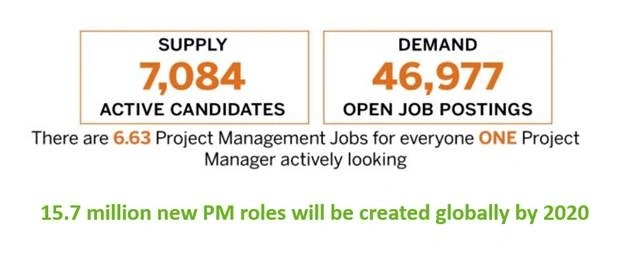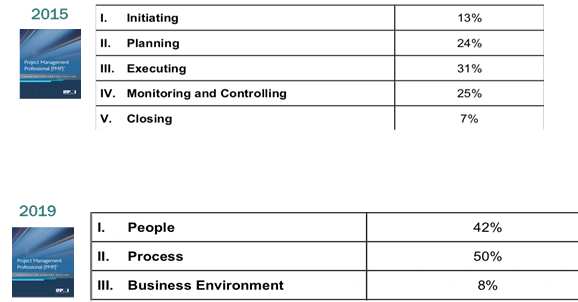Project management is growing rapidly as technologies advance and is considered one of the top desired skills within IT. According to AgilePremier.com, in 2017 there were about 47,000 open job postings, with just over 7,000 active candidates. This means there were 6.63 project management jobs for every one project manager actively looking. With these statistics alone, it's expected that 15.7 million new PM roles will be created by 2020. As projects grow, they become more complex and can fail very easily, so when organizations take on any type of project, they find it's not only important, but crucial, that these projects are managed by certified professionals. In fact, according to Price Waterhouse Coopers, almost 80% of high-performing projects are led by certified project managers.

Where do these project managers go to become certified? Project Management Institute.
The Project Management Institute has been around for 50 years now and created the Project Management Body of Knowledge - Guide (PMBOK-Guide), which incorporates the processes and concepts necessary to support the development of the project management as a profession. With this idea, came the Project Management Professional (PMP) Certification The PMP is one of the top certifications offered within Project Management and as of June 30 of this year, there were 932,720 total active PMP holders worldwide.
To ensure a fair and defensible exam, PMI conducts a Role Delineation Study as the basis for the exam. This process defines the responsibilities of the practitioners within a particular profession. It's performed through two phases: Definition of Responsibilities (decided by a panel of advisors) and validation (by practitioners of the profession). More specifically, PMI states, "this process utilizes knowledge and task-driven guidelines to assess the practitioner's competence, and determine the levels of salience, criticality, and frequency of each of the knowledge, tasks, and skills required to perform to the industry- wide standard in the role of a project manager"
Now, this isn't a one and done type process. As stated before, Project Management is a rapidly growing industry and PMI is well aware. To keep up, they perform a Global Practice Analysis every 3-5 years to find new trends in the profession and assess the roles of a project manager. PMI conducted this exact research this year, which led them to the realization that the role of a Project Manager has expanded.
How is the PMP Exam Changing in 2020?
This past June, PMI announced the latest release of the new exam outline with brand new domains. The new PMP Exam, due to release July 2020, will focus on People, Process and Business Environment.
So what does this mean? It's now recognized that projects revolve around leadership and businesses. The role of the Project Manager is expanding, and now it's expected they manage conflict, lead, build and empower their teams, and collaborate and negotiate with stakeholders. Another important role of a Project Manager is to manage communications with stakeholders, plan and manage budget, resources, schedules, etc. while also finding a way to evaluate and deliver project benefits and value. The new PMP exam will focus on all of these aspects, plus more. The exam will also have an even split, 50% will be focused on Agile/Hybrid approaches, while the remaining 50% will be focused on Predictive Project Management approaches. PMI has released a full Exam Content Outline which can be viewed here.
- PEOPLE - emphasizing the skills and activities associated with effectively leading a project team
- PROCESS - reinforcing the technical aspects of managing a project
- BUSINESS ENVIRONMENT - highlighting the connection between projects and organization strategy
When is the PMP Exam Changing?
PMI initially announced the release of the new exam for December 15th. After some feedback, they decided to push that date to July. The last day to take the current PMP Exam is June 30, 2020. If you're prepared and ready to take the exam now, you should take the current version. Taking the exam when you're most prepared is the best approach. The new version will cover more Agile, so if you're working in an Agile environment, it may be beneficial to take the exam after June.Whether you're ready to take it now or after June, PMI advises you schedule your exam early and states most people reserve their exam date 3 months in advance. PMI advises you follow the PMP timeline as well, stating: "You have one year from the date of your application approval to pass the exam. Sometimes, more than one attempt is necessary so be sure to leave enough time to re-take the exam before your eligibility expires (one year after your application is approved (PMI.org)".


